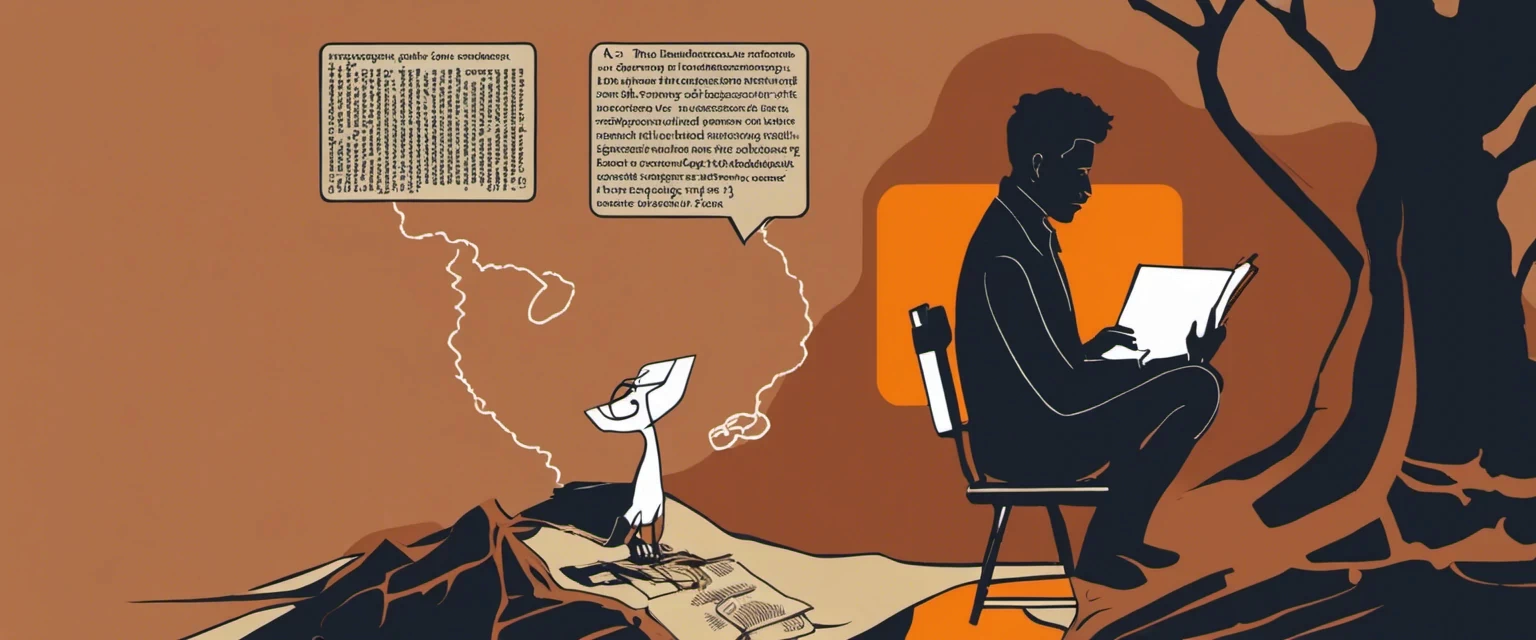—A Troublesome Inheritance & The Blank Slate
In the realm of understanding the intricate nature of human behavior, two books stand out as prominent voices in the ongoing debate regarding the existence and influence of human nature. Nicholas Wade’s thought-provoking work, “A Troublesome Inheritance,” and Steven Pinker’s critically acclaimed masterpiece, “The Blank Slate: The Modern Denial of Human Nature,” offer distinct perspectives on how our genetic makeup shapes us as individuals and societies.
Wade’s “A Troublesome Inheritance” invites readers to delve into the controversial realm of genetic determinism, challenging long-held assumptions about the impact of human evolution on our cognition, behavior, and societies. Wade argues that our genetic heritage, acquired over thousands of years of adaptation and migration, plays a pivotal role in shaping our characteristics, including intelligence, temperament, and even complex social behaviors. Drawing from an extensive range of scientific disciplines, anthropology, and genetics, Wade stimulates a discourse challenging prevailing notions of human diversity and equality.
Contrastingly, Pinker’s “The Blank Slate” provides a compelling counter-narrative to the idea of an innately predisposed human nature. Pinker dismantles the concept of the “blank slate,” arguing that both genes and environment shape our individual and collective identities. Pinker advocates for a middle ground, rejecting the extreme notion that biology determines our every action while emphasizing the critical role of biology in conjunction with cultural and environmental factors. With his characteristic eloquence and thorough research, Pinker explores the complex interplay between nature and nurture, debunking the notion that we are mere products of our genes.
While both authors traverse the complex and intricate terrain of human nature, they approach the subject matter from different perspectives, leading to divergent conclusions. Wade’s “A Troublesome Inheritance” bolsters the case for genetic determinism, while Pinker’s “The Blank Slate” illuminates the multifaceted influences that shape our identities and behaviors. As readers embark upon this comparative study, they will be confronted with a profound exploration of how our genes and environment, or lack thereof, intertwine to forge the essence of what it means to be human.
In the chapters that follow, we explore the arguments, evidence, and implications put forth by Nicholas Wade and Steven Pinker. By undertaking this comparative study, we strive to elucidate the controversies surrounding human nature, the impact of genetics on our behavior and societies, and the precarious balance between biological predispositions and environmental influences. Ultimately, through an informed analysis of these contrasting perspectives, we hope to deepen our understanding of the complex interplay between nature and nurture and the implications it holds for our understanding of humanity.
Brief Summary of Two Books
A Troublesome Inheritance by Nicholas Wade
“A Troublesome Inheritance” by Nicholas Wade explores the underlying role of genetics in shaping human behavior, culture, and societal structure. Wade argues that genetic variations between different populations have influenced their respective societal development, leading to disparities in traits such as intelligence, aggression, and social organization. Wade examines the evolutionary history of human populations, DNA differences, and the effects of natural selection to support his claims. The book invites a controversial discussion on the mechanisms by which genetics may have influenced human societies and provides a thought-provoking perspective on the interplay between biology and culture.
The Blank Slate: The Modern Denial of Human Nature by Steven Pinker
The Blank Slate: The Modern Denial of Human Nature” by Steven Pinker challenges the idea that humans are born as a ‘blank slate’ and argues that human behavior is not solely shaped by society and culture. Pinker examines the influential role of genes in our temperament, abilities, and predispositions, debunking the notion that we are purely products of our environment. He explores controversial topics such as gender differences, violence, and intelligence, presenting evidence from various disciplines including biology, psychology, and anthropology. Ultimately, Pinker contends that acknowledging our innate human nature helps us understand ourselves better and contributes to a more informed and compassionate society.
Comparison between Two Books

Similarities in human evolution
Both “A Troublesome Inheritance” by Nicholas Wade and “The Blank Slate: The Modern Denial of Human Nature” by Steven Pinker delve into the topic of human evolution, although they differ in their perspective and conclusions. Despite these differences, there are several key similarities regarding human evolution that can be identified in both books:
1. Genetic Basis of Human Behavior: Both books acknowledge that human behavior is influenced by genetic factors. They recognize that our genetic makeup plays a significant role in shaping our psychological traits, including intelligence, personality, and even our propensity for certain behaviors.
2. Evolutionary History: Wade and Pinker agree that understanding human evolution is crucial in comprehending the characteristics and abilities of modern humans. They discuss the impact of natural selection, genetic mutations, and the process of adaptation in shaping the human species.
3. Gene-Culture Coevolution: Both authors explore the concept of gene-culture coevolution, highlighting how genetic traits and cultural practices can mutually influence and shape each other over time. They argue that human culture has evolved in tandem with genetic adaptations, illustrating the interplay between biology and culture in shaping human societies.
4. Polygenetic Traits: Wade and Pinker emphasize that many human traits, such as intelligence, behavior, and disease susceptibility, are influenced by multiple genes. They argue against oversimplification and reductionism in solely attributing these complexities to a single gene or environmental factor.
5. Human Variation: Both authors discuss the inherent genetic diversity within the human species. They reject the notion of humans being a homogenous group, instead emphasizing the existence of varying genetic backgrounds and the significance of understanding individual differences.
It is important to note that while these similarities exist between the two books, they differ greatly in their overall viewpoints and conclusions. Wade’s “A Troublesome Inheritance” argues for the existence of race-based genetic differences, whereas Pinker’s “The Blank Slate” challenges the idea of determinism, emphasizing the role of environmental factors and human agency.
Divergences in human evolution
A Troublesome Inheritance by Nicholas Wade and The Blank Slate: The Modern Denial of Human Nature by Steven Pinker are both seminal works in the field of human evolution and the nature versus nurture debate. While both books explore the topic of human evolution, they approach the subject from different angles and have divergent viewpoints.
Wade’s A Troublesome Inheritance focuses on the role of genetic variation in shaping human societies and behaviors. He argues that genetic differences between races and populations have played a significant role in the development of human cultures and civilizations. Wade delves into the evolutionary history of different populations, highlighting how genetic adaptations to local environments have shaped human societies. He argues that certain behavioral traits, such as tendencies towards aggression or collectivism, can be attributed, at least partially, to genetic factors. This viewpoint has drawn criticism for potentially perpetuating harmful racial stereotypes.
On the other hand, Pinker’s The Blank Slate rejects the notion of genetic determinism and emphasizes the importance of environmental and cultural factors in shaping human behavior. He argues against a blank slate view of human nature, which suggests that humans are born with no innate traits and are completely molded by their environment. Pinker demonstrates that there is a significant body of evidence supporting the existence of human nature and that it interacts with cultural and environmental influences. While acknowledging that genetics may play a role in certain behavioral characteristics, Pinker advocates for a more nuanced understanding of human nature that takes into account the complex interplay between genes, culture, and environment.
The key divergence between these books lies in the extent to which they attribute human behaviors and societal differences to genetics versus culture and environment. Wade’s A Troublesome Inheritance places more emphasis on genetic determinism, suggesting that genetic differences between populations play a significant role in shaping human behavior and societal outcomes. This perspective has drawn criticism from some scholars for oversimplifying the complex interplay between genes and culture.
In contrast, Pinker’s The Blank Slate argues for a more nuanced view, acknowledging that genetics can influence certain behaviors, but also emphasizing the interactive nature of genes, culture, and environment. Pinker highlights the importance of cultural and environmental factors, such as education and socialization, in shaping human behavior and societal outcomes. He advocates for a balanced understanding that considers both genetic and environmental influences.
In conclusion, A Troublesome Inheritance by Nicholas Wade and The Blank Slate by Steven Pinker present different perspectives on the role of genetics versus culture and environment in human evolution. While Wade focuses more on genetic determinism and its impact on human behavior and societal differences, Pinker argues for a more balanced approach that considers the multifaceted interactions between genes, culture, and environment.

Conclusion
Both books have their merits and offer different perspectives on the topic of human nature.
“A Troublesome Inheritance” by Nicholas Wade explores the influence of genetics on human behavior and societies. It delves into the topic of race and genetics, discussing how genetic variations may have contributed to differences in human societies. It addresses controversial ideas and challenges prevailing cultural and political attitudes toward these topics.
“The Blank Slate: The Modern Denial of Human Nature” by Steven Pinker, on the other hand, argues against the idea that human behavior is determined solely by culture or upbringing. Pinker explores how genetics and evolutionary processes shape our behavior and cognition. He challenges the notion of the “blank slate,” which suggests that humans are born without any inherent traits, arguing that there is evidence to support the idea of a universal human nature.
Both books delve into contentious topics and offer thought-provoking insights. However, the choice between the two depends on personal interests and perspectives. If you are interested in exploring the influence of genetics on human behavior and society, “A Troublesome Inheritance” by Nicholas Wade may be more suitable for you. On the other hand, if you are more interested in understanding the denial of human nature and exploring the impact of genetics on human behavior and cognition, “The Blank Slate” by Steven Pinker may be a better choice. It ultimately depends on what aspect of the nature-nurture debate interests you more.



